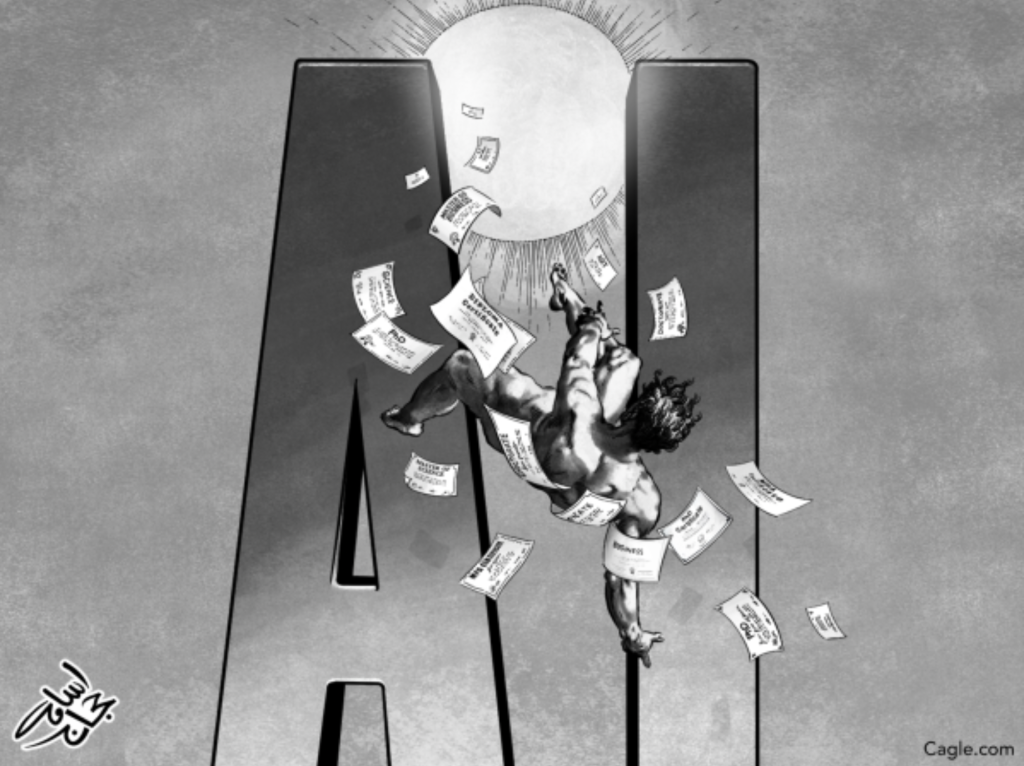Anyone familiar with the classic Terminator movie franchise launched in 1984 by director James Cameron remembers the dark, futuristic storyline of man versus machine. At the time of its release, the story about a visitor from the future warning of the power of unchecked AI seemed like a cautionary tale that was good fun entertainment. The soldier-messenger was sent to guard Sarah Connor against an AI-created assassin also sent from the future and bent on killing her and dooming humanity. In 2023, with the release of the newest AI-fueled chatbots and image-generating programs, the dystopian future envisioned in Terminator seems to have just gotten a lot more real.
While nuclear armageddon launched by a self-aware AI system may still not come to pass, the devastation caused by AI to our culture and our middle class is just around the corner.
The latest AI chatbots like ChatGPT and image generators like Dall-E 2, and Lensa, offer a quantum leap forward in their ability to produce sophisticated creative content. With a few common language prompts, almost anyone can generate prose, code, or unique photographic, video, and animated images. Like a dope dealer trying to get customers hooked, these AI programs are currently available to the public for free, or at a relatively low cost. So what could possibly go wrong?
AI chatbots, image generators, deep fake technology, big data, and social media are all powerful threads being woven together into a noose that’s poised to strangle creativity and kill the white-collar middle class.
The first professions to be decimated will be writers (journalists, copywriters, technical writers, and coders), photographers, illustrators, and translators. Next affected will be professions that conduct research, analyze data, and then produce reports, such as lawyers and accountants.
Here’s how it will work. Employers who currently rely on a team of writers or coders to produce content for publications, websites, and applications will start cutting staff. They will keep just a few writers, editors, or supervisors to input prompts, review output, and fact check the AI-generated content.
While the new AI programs are vastly improved over previous versions, they still suffer from the “garbage in – garbage out” syndrome. Since these programs are sourcing vast amounts of existing material to create new content, a percentage of that source material is bound to be incorrect. As AI weaves misinformation into more and more content, the misinformation problem will get much worse.
All one has to do is look at the current status of social media and politically motivated media to see the proliferation of unfounded conspiracies masquerading as facts. These so-called “alternative facts” will only exacerbate the “garbage in” problem.
Of course lax standards for factuality is good news for those profiting off AI programs. A lazy society will binge on the cheap inaccurate cultural fast-food served up by AI programs to the sole benefit of mega corporations like Microsoft, Google, and OpenAI.
The changes in the economic landscape will be profound. Consider the current reality where professional photographers trying to sell stock images have to compete with image generators available at fraction of the cost. The upheaval in the writing professions will also play out in the other arts such as music, fine art, animation, and video production.
When a generation is raised on reading, viewing, and listening to AI-generated content, or using AI generators to produce creative works, the literary and artistic skills in humanity will atrophy. Just ask someone under 18 years old today to read an analog clock, balance a checkbook, write a letter in cursive, or remember an important phone number without access to their contact list. All those skills that used to be ubiquitous have all but disappeared because technology has made those tasks less important. A dumber, less creative world is almost a certainty if this AI trend is left unchecked.
For those in fields like service, travel, leisure, and retail, who think they will be spared from the AI devastation, think again. When the middle class is decimated, their discretionary income will evaporate and will take down all sectors, except those catering to the super rich. Business owners with much lower payroll costs will benefit. They might even pass on some of the savings to consumers, but that will be cold comfort to the chronically unemployed masses who will be less able to buy goods and services at even reduced rates.
Because many of these “free” AI programs count on users to give feedback and improve the AI results, we are actively working against our own best interests.
It is hard not to get excited by the amazing abilities of this new technology. It’s like we are thrill seekers speeding down a slippery path just before we realize the path ends at a cliff.
I think institutions should strictly regulate AI usage, and consumers should reject creative content generated by AI. I don’t advocate for Sarah Connor-like violence against AI developers and systems, but following her instincts, we need to terminate this trend where machines are the masters and we are mindless consumers of their synthetic culture.

